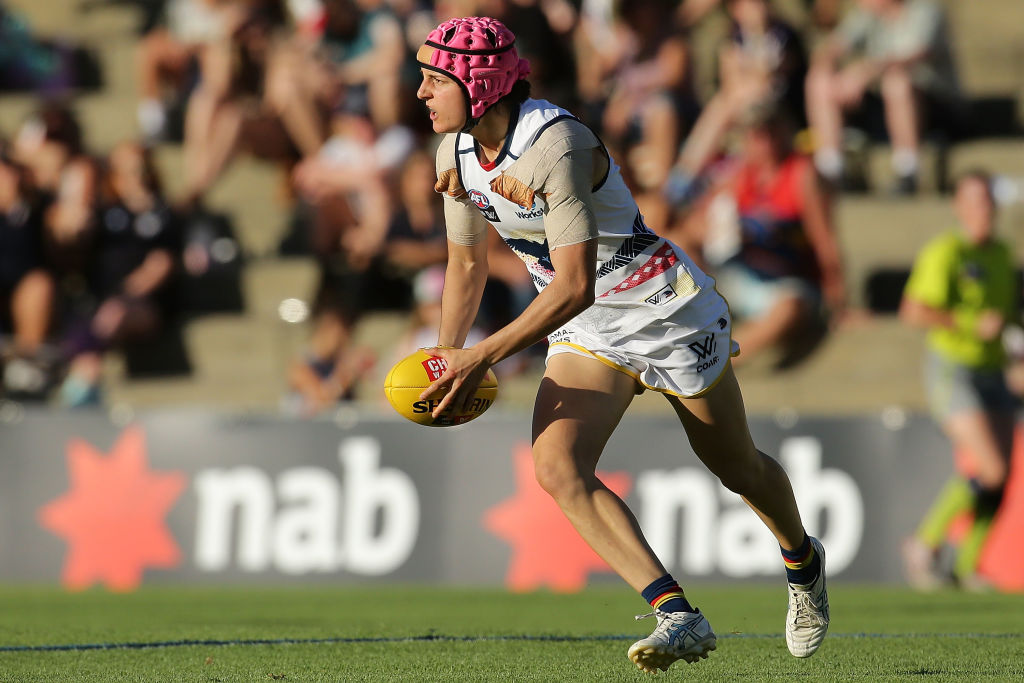Brain disease linked to head injuries diagnosed in female athlete for first time


A free daily email with the biggest news stories of the day – and the best features from TheWeek.com
You are now subscribed
Your newsletter sign-up was successful
The world's first case of the brain disease chronic traumatic encephalopathy, or CTE, has been found in a female athlete, researchers said.
Heather Anderson, an Australian Football League player, was found to be in the early stages of the disease, according to a research report published in Acta Neuropathologica by scientists who performed her autopsy. CTE can only be diagnosed posthumously — Anderson died by suicide last November at the age of 28.
CTE is described by the Mayo Clinic as "a brain disorder likely caused by repeated head injuries," which "causes the death of nerve cells in the brain" and can lead to cognitive impairment, motor problems, and mood disorders. Up until now, CTE has only been diagnosed and observed in male athletes, but the report said the rise in female contact sports will likely lead to more diagnoses.
The Week
Escape your echo chamber. Get the facts behind the news, plus analysis from multiple perspectives.

Sign up for The Week's Free Newsletters
From our morning news briefing to a weekly Good News Newsletter, get the best of The Week delivered directly to your inbox.
From our morning news briefing to a weekly Good News Newsletter, get the best of The Week delivered directly to your inbox.
"As the representation of women in professional contact sports is growing, it seems likely that more CTE cases will be identified in female athletes," the report said. "Given females' greater susceptibility to concussion, there is an urgent need to recognize the risks, and to institute strategies and policies to minimize traumatic brain injuries in increasingly popular female contact sports."
Anderson began playing Australian rules football when she was five years old, The New York Times reported. She played professionally in Australia's top league before a shoulder injury ended her career in 2017 at the age of 23. Her father, Brian Anderson, told ABC Australia, "Now that this report has been published, I'm sort of trying to think about how it might play out for female sportspeople everywhere."
"I don't think any child should be playing the contact version of a sport before high school," Michael Buckland, the report's co-author, told CNN, adding that women's contact sports need to implement measures to combat head injuries.
A free daily email with the biggest news stories of the day – and the best features from TheWeek.com
Justin Klawans has worked as a staff writer at The Week since 2022. He began his career covering local news before joining Newsweek as a breaking news reporter, where he wrote about politics, national and global affairs, business, crime, sports, film, television and other news. Justin has also freelanced for outlets including Collider and United Press International.
-
 6 of the world’s most accessible destinations
6 of the world’s most accessible destinationsThe Week Recommends Experience all of Berlin, Singapore and Sydney
-
 How the FCC’s ‘equal time’ rule works
How the FCC’s ‘equal time’ rule worksIn the Spotlight The law is at the heart of the Colbert-CBS conflict
-
 What is the endgame in the DHS shutdown?
What is the endgame in the DHS shutdown?Today’s Big Question Democrats want to rein in ICE’s immigration crackdown
-
 5 recent breakthroughs in biology
5 recent breakthroughs in biologyIn depth From ancient bacteria, to modern cures, to future research
-
 Blue Origin launches Mars probes in NASA debut
Blue Origin launches Mars probes in NASA debutSpeed Read The New Glenn rocket is carrying small twin spacecraft toward Mars as part of NASA’s Escapade mission
-
 Dinosaurs were thriving before asteroid, study finds
Dinosaurs were thriving before asteroid, study findsSpeed Read The dinosaurs would not have gone extinct if not for the asteroid
-
 SpaceX breaks Starship losing streak in 10th test
SpaceX breaks Starship losing streak in 10th testspeed read The Starship rocket's test flight was largely successful, deploying eight dummy satellites during its hour in space
-
 Rabbits with 'horns' sighted across Colorado
Rabbits with 'horns' sighted across Coloradospeed read These creatures are infected with the 'mostly harmless' Shope papilloma virus
-
 Lithium shows promise in Alzheimer's study
Lithium shows promise in Alzheimer's studySpeed Read Potential new treatments could use small amounts of the common metal
-
 Scientists discover cause of massive sea star die-off
Scientists discover cause of massive sea star die-offSpeed Read A bacteria related to cholera has been found responsible for the deaths of more than 5 billion sea stars
-
 'Thriving' ecosystem found 30,000 feet undersea
'Thriving' ecosystem found 30,000 feet underseaSpeed Read Researchers discovered communities of creatures living in frigid, pitch-black waters under high pressure
